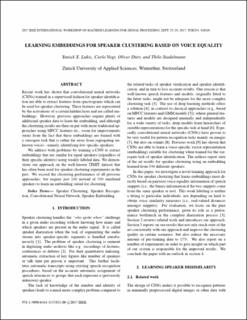Bitte benutzen Sie diese Kennung, um auf die Ressource zu verweisen:
https://doi.org/10.21256/zhaw-3762| Publikationstyp: | Konferenz: Paper |
| Art der Begutachtung: | Peer review (Publikation) |
| Titel: | Learning embeddings for speaker clustering based on voice equality |
| Autor/-in: | Lukic, Yanick X. Vogt, Carlo Dürr, Oliver Stadelmann, Thilo |
| DOI: | 10.21256/zhaw-3762 10.1109/MLSP.2017.8168166 |
| Tagungsband: | 2017 IEEE 27th International Workshop on Machine Learning for Signal Processing (MLSP) |
| Angaben zur Konferenz: | 27th IEEE International Workshop on Machine Learning for Signal Processing (MLSP 2017), Tokyo, 25-28 September 2017 |
| Erscheinungsdatum: | 2017 |
| Verlag / Hrsg. Institution: | IEEE |
| ISBN: | 978-1-5090-6341-3 |
| Andere Identifier: | INSPEC Accession Number: 17416144 |
| Sprache: | Englisch |
| Schlagwörter: | Datalab; Speaker recognition; Deep learning; Speaker clustering |
| Fachgebiet (DDC): | 006: Spezielle Computerverfahren |
| Zusammenfassung: | Recent work has shown that convolutional neural networks (CNNs) trained in a supervised fashion for speaker identification are able to extract features from spectrograms which can be used for speaker clustering. These features are represented by the activations of a certain hidden layer and are called embeddings. However, previous approaches require plenty of additional speaker data to learn the embedding, and although the clustering results are then on par with more traditional approaches using MFCC features etc., room for improvements stems from the fact that these embeddings are trained with a surrogate task that is rather far away from segregating unknown voices - namely, identifying few specific speakers. We address both problems by training a CNN to extract embeddings that are similar for equal speakers (regardless of their specific identity) using weakly labeled data. We demonstrate our approach on the well-known TIMIT dataset that has often been used for speaker clustering experiments in the past. We exceed the clustering performance of all previous approaches, but require just 100 instead of 590 unrelated speakers to learn an embedding suited for clustering. |
| URI: | https://digitalcollection.zhaw.ch/handle/11475/7088 |
| Volltext Version: | Akzeptierte Version |
| Lizenz (gemäss Verlagsvertrag): | Lizenz gemäss Verlagsvertrag |
| Departement: | School of Engineering |
| Organisationseinheit: | Institut für Informatik (InIT) Institut für Datenanalyse und Prozessdesign (IDP) |
| Enthalten in den Sammlungen: | Publikationen School of Engineering |
Dateien zu dieser Ressource:
| Datei | Beschreibung | Größe | Format | |
|---|---|---|---|---|
| MLSP_2017.pdf | 1.37 MB | Adobe PDF |  Öffnen/Anzeigen |
Zur Langanzeige
Lukic, Y. X., Vogt, C., Dürr, O., & Stadelmann, T. (2017). Learning embeddings for speaker clustering based on voice equality. 2017 IEEE 27th International Workshop on Machine Learning for Signal Processing (MLSP). https://doi.org/10.21256/zhaw-3762
Lukic, Y.X. et al. (2017) ‘Learning embeddings for speaker clustering based on voice equality’, in 2017 IEEE 27th International Workshop on Machine Learning for Signal Processing (MLSP). IEEE. Available at: https://doi.org/10.21256/zhaw-3762.
Y. X. Lukic, C. Vogt, O. Dürr, and T. Stadelmann, “Learning embeddings for speaker clustering based on voice equality,” in 2017 IEEE 27th International Workshop on Machine Learning for Signal Processing (MLSP), 2017. doi: 10.21256/zhaw-3762.
LUKIC, Yanick X., Carlo VOGT, Oliver DÜRR und Thilo STADELMANN, 2017. Learning embeddings for speaker clustering based on voice equality. In: 2017 IEEE 27th International Workshop on Machine Learning for Signal Processing (MLSP). Conference paper. IEEE. 2017. ISBN 978-1-5090-6341-3
Lukic, Yanick X., Carlo Vogt, Oliver Dürr, and Thilo Stadelmann. 2017. “Learning Embeddings for Speaker Clustering Based on Voice Equality.” Conference paper. In 2017 IEEE 27th International Workshop on Machine Learning for Signal Processing (MLSP). IEEE. https://doi.org/10.21256/zhaw-3762.
Lukic, Yanick X., et al. “Learning Embeddings for Speaker Clustering Based on Voice Equality.” 2017 IEEE 27th International Workshop on Machine Learning for Signal Processing (MLSP), IEEE, 2017, https://doi.org/10.21256/zhaw-3762.
Alle Ressourcen in diesem Repository sind urheberrechtlich geschützt, soweit nicht anderweitig angezeigt.